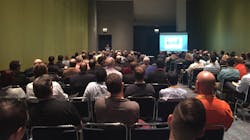Scott Cochrane on the future of building automation at AHR Expo
Scott Cochrane, president and CEO of Cochrane Supply & Engineering, addressed a full room at his AHR Expo Education Session, "The Future of Building Automation - Data at the Open Intelligent Edge," given on Monday January 22nd. He talked about how new ways of operating within the controls & automation business were emerging as the PC client/server era, transformed into the Cloud era, which is now giving way to the era of smart devices and edge computing. Edge devices and mobile apps are starting to change how we manage HVAC, security, refrigeration, lighting and other facilities management services.
Cochrane recalled the day almost 30 years ago when his father, who founded Cochrane Supply, first grasped how the change from pneumatic controls to DDCs would forever alter his business. The elder Cochrane said, “Son, we are going to sell a lot of computers.”
He was talking about PC-based building automation system central consoles. Cochrane has long sold products and services for a full spectrum of BAS brands. In the transition to the edge computing paradigm, Scott hears an echo of his father’s words, but this time he is saying “Son, you are going to sell a lot of mobile apps and smart devices that work with building automation systems.”
He pointed to the Amazon Dot and said “Internet of Things (IoT) devices for the home are bringing new function and unlocking more capabilities and business for us in the commercial space. We’ve got to embrace the new technology and update how we deliver the information, the safety, and the building services that end-users demand. As with consumer products, the power of people is taking over our business. People not only are getting more demanding, they are the source of new data, and more. At Cochrane, we’re working on five or six apps right now that are about knowing where people are and serving them the information they need to make their experiences better.
“Regarding the role of Master Systems Integrators, MSIs are putting in the data backbones that we will be using to deliver all these new services reliably and securely. I’m encouraging them to invest in Ethernet and fiber backbone, not RS-485. They need the bandwidth for growth, as we are only at the beginning of this era. I also recommend that they isolate building data networks from the owner’s enterprise business network. The work of an MSI now has a strong IT and consulting component.”
The next day Scott Cochrane presented in a second AHR Expo Ed session, "Are Master System Integrators Becoming the New Building Data Architects?," this time with Jason Houck, Chief Information Officer of Hepta Systems. Their panel discussion covered “Are Master System Integrators Becoming the New Building Data Architects?” There Cochrane explained that the relationship between MSIs and building owners can be categorized at three levels:
There are really three tiers of relationship: Once MSI services were procured through a General Contractor and there was no direct relationship with the owner. Now that the specifying community is coping with Section 25 of the ASHRAE spec, they are bringing in controls expertise and MSI services earlier in the design phases. The next level is when the MSI is engaged by the owner directly like any other professional managed service. The greatest potential for success and true partnership exists at this level when the MSI serves as trusted advisor to the owner.
– Scott Cochrane
The cost of integration comes down when the work emphasizes a software API approach that involves remote monitoring versus traditional hardware integration via gateways.
Today you can equip building assets with secure ‘Call Home’ abilities. Be wary of the proprietary APIs (application programming interfaces) supplied by any one OEM. They may not want to supply all of the data you will eventually need to diagnose a building- or systems-level problem or to deliver some new service. Actually, it is tough for one person to be an MSI, there is so much to know. Think of pulling together a team that has all the mechanical/electrical engineering and software development skills you’ll need.
– Jason Houck
Scott Cochrane wants people in the buildings industries to keep thinking and talking about these important and evolving topics, and he will continue to team up with AutomatedBuildings.com to keep the conversation going.
About the Author
Therese Sullivan
Editor/Owner/Founder
Therese views Smart Buildings, Smart Grid, Smart Cities and Industry 4.0 through a Silicon Valley lens. She promotes open protocols and industry standards through her work as Editor of Project Haystack Connections magazine, Contributing Editor to AutomatedBuildings.com, Contributing Writer to NewDeal.blog, and marketing strategy consultant to many innovators in the intelligent buildings market.
